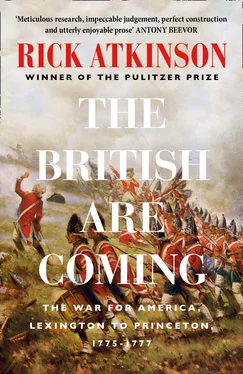Collecting bodies began promptly. A Dedham militia company was ordered to search the battlefield and to bury the unburied. Reverend David McClure rode from Roxbury toward Lexington in the drizzle that fell on Thursday, April 20. “I saw several dead bodies, principally British, on & near the road,” he wrote. “They were all naked, having been stripped.… They lay on their faces.” As a gesture to British widows and orphans she would never know but could not ignore, Mary Hartwell of Lincoln took her children by the hand and followed an ox-cart hearse to a large trench in the town burial ground where the dead regulars were interred. “There was one in a brilliant uniform, whom I supposed to have been an officer,” she recalled. “His hair was tied up in a queue.”
The fourteen-year-old son of John Hicks found his father’s body on the roadside near the Watson’s Corner barricade; the boy took him home in a wagon. The corpse of Isaac Davis, killed in the first volley at North Bridge, was laid out in his bedroom before interment with some of his other comrades from Acton. “His countenance was pleasant, and seemed little altered,” his widow, Hannah, would recall in 1835 when she was eighty-nine. Davis’s epitaph deemed him “a loving husband, a tender father, a kind neighbor, an ingenious craftsman, and serviceable to mankind.”
In Danvers, a young girl noted that the seven dead men stacked on a cart all wore gray homespun stockings; two minute companies with reversed arms and muffled drums escorted them to their common grave. A dozen corpses in Menotomy were hauled to a burial trench on an ox-drawn sled, legs and arms splayed and rubbery; they were buried, a witness reported, “head to point, with their clothes on just as they fell.” The eight dead from Lexington were laid in rude coffins, described as “four large boards nailed up.” Villagers dug a trench close to the tree line in the cemetery. “I saw them let down into the ground,” a daughter of Reverend Clarke recalled. “It was a little rainy, but we waited to see them covered up with clods.” Using pine and oak boughs, the parson himself helped hide the raw gash in case the British should return in a mood of desecration.
The British would never return, not here. The first of the war’s thirteen hundred actions had been fought, the first battle deaths mourned. Fifty-eight towns and villages, from Acton to Woburn, had sent men into the fight; fourteen thousand had marched against the regulars, of whom about four thousand actually heaved themselves at the British column. For all the chaos of the day, the Americans had demonstrated impressive organizational skills, although combat leadership above the grade of captain had been erratic and sometimes nonexistent. Each militia company had essentially fought alone, improvising without tactical orchestration from higher command. A Massachusetts general—the tubby, sensible William Heath of Roxbury—had trundled out to Menotomy on Wednesday afternoon, perhaps inspiriting young musketmen but hardly imposing his will on what was the first battle he had ever seen. On Thursday he would be supplanted by Major General Artemas Ward, who shrugged off an excruciating attack of kidney stones to ride forty miles from his Shrewsbury farm to Cambridge.
The limits of the musket even in close combat were clear enough after the daylong battle. Later scholars calculated that at least seventy-five thousand American rounds had been fired, using well over a ton of powder, but only one bullet in almost three hundred had hit home. The shot heard round the world likely missed. Fewer than one militiaman in every ten who engaged the column drew British blood, despite the broad target of massed redcoats. A combat bromide held that it took a man’s weight in bullets to kill him, and on Battle Road that equation was not far exaggerated.
Still, British survivors emerged from the maelstrom with a new respect for American fighters. “Whoever looks upon them as an irregular mob will find himself very much mistaken,” Percy wrote General Harvey, the adjutant general in London, a few hours after returning to Boston. “They have men amongst them who know very well what they are about.” Lieutenant Mackenzie acknowledged his foe’s “violent and determined spirit.”
The British combat performance, if often courageous in the ranks, had been troubling, with miserable staff work and inert commanders, Percy excepted. The day’s action included looting, arson, and various atrocities, suggesting that the usual decorum of eighteenth-century warfare would be adapted to an American setting. On April 21, Gage publicly rebuked his men for “great inattention and neglect to the commands of their officers”; he demanded that they “behave with more discipline and in a more soldierlike manner.” General Harvey, upon reading accounts of April 19, later wrote, “I am much concerned at the wild behavior of the men.” To Percy he added, “It was an unlucky day.”
Like a burning fuse, accounts of that day raced across New England and down the seaboard, carried in some instances by Paul Revere for a four-shilling per diem plus “expenses for self and horse.” “To arms!” criers cried. “Gage has fired upon the people!” A rider appeared on a Providence wharf where deckhands were unloading salt. “War, war, boys,” he called. “There is war.” Newspapers printed stories of variable accuracy, beginning with a twenty-six-line account in the loyalist Boston News-Letter on April 20, deploring “this shocking introduction to all the miseries of a civil war.” The New-Hampshire Gazette ’s headline read, “Bloody News.”
In barely three weeks, the first reports of the day’s action would reach Charleston and Savannah. Lurid rumors spread quickly: of grandfathers shot in their beds, of families burned alive, of pregnant women bayoneted. Americans in thirteen colonies were alarmed, aroused, angry. “The times are very affecting,” Reverend Ezra Stiles told his diary in Rhode Island on April 23. Freeholders in Hackensack authorized payment of a shilling and sixpence to a local gunsmith for each musket cleaned. Eight thousand citizens rallied for a town meeting in Philadelphia, where an observer noted that “the rage militaire , as the French call a passion for arms, has taken possession of the whole continent.” A New Yorker wrote a friend in London, “There is no such thing as being a looker on.” Militia companies in Pennsylvania rushed to order drums and colors; soon men in uniform, said to be “as thick as bees,” were exercising twice daily under arms, including many “Broadbrims,” as John Adams called the pacifist Quakers.
Meeting in Concord on April 22, the Massachusetts Provincial Congress appointed a committee to take sworn statements from nearly a hundred eyewitnesses, to be published promptly in colonial newspapers. Joseph Warren appended a cover letter to these accounts, lamenting that “we are at last plunged into the horrors of a most unnatural war.” The myth of violated innocence meant that the rebel stockpiling of war supplies in recent months must remain obscure, along with details about the colony’s deft, robust call to arms. A narrative congealed, and with it a brilliant propaganda stratagem: Gage was the aggressor; redcoats fired first; helpless civilians had been slaughtered.
A swift American schooner, the Quero , sailed from Salem for England on April 29 carrying recent copies of the Essex Gazette , with an article that began, “Last Wednesday, the 19th of April, the Troops of his Britannick Majesty commenced Hostilities upon the People of this Province.” The cargo also included eyewitness depositions and a corroborative statement from a captured British officer. Warren admonished the skipper, Captain John Derby, to keep the voyage “a profound secret from every person on earth.” After an unmolested crossing in just twenty-nine days, Derby delivered his packet in London, where the accounts appeared in the three-penny Evening Post to be read by, among others, George III and Lord North.
Читать дальше












